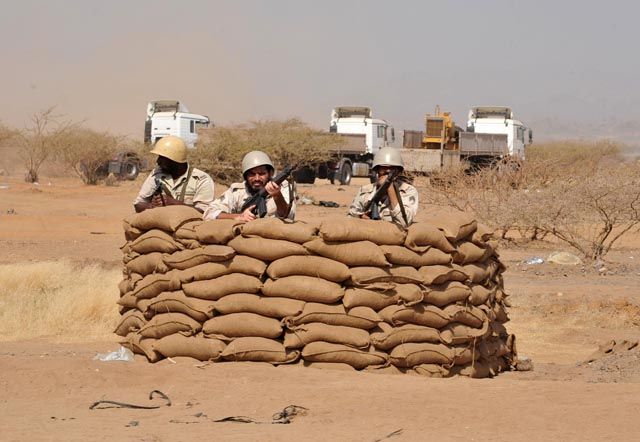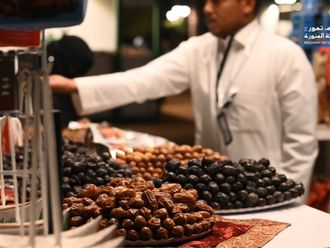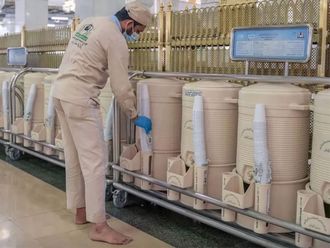Riyadh: The recent armed incursion of Al Houthi rebels across Saudi borders was part of a well planned operation for which preparations had begun several weeks ago, according to well-informed Saudi security sources.
"The rebels had started digging trenches on the Yemeni part of Jabal Dukhan mountainous region on the border even before two months. The rebels exploited their growing dominance as well as absence of Yemeni border guards on that part of Jabal Dukhan," the sources said.
These trenches could be seen on a vast stretch of mountainous regions from where the rebels were flushed out as a result of the ongoing Saudi military operation.
"The rebels used these trenches in their attack against Saudi border guards at Markaz Khald border point last week, killing one official and wounding another 15. These two-metre deep trenches, dug on mountaintops, gave them protection from artillery fire and even from air raids of Saudi fighters, besides using them as arms depots and warehouses for foodstuffs," Asharq Al Awsat newspaper reported quoting the sources.
"One of these arms depots was detonated following artillery fire from the Saudi side," the sources said. Al Houthis have been using these tactics in their fight against Yemeni forces in the north western border region of Sa'ada since 2004.
Meanwhile, Saudi Apache fighter jets started taking part for the first time in air raids, with more planes expected to take part in future raids. Tornado and F15 fighters were used in earlier raids. A group of paratroopers from the Tabuk Military Base arrived in the conflict zone and is expected to take part in the operation soon. The fighter jets resumed their air raids early Tuesday morning around the areas close to Jabal Dukhan.
At the same time, tribal women were also taking part in the patrol operations started by major Saudi tribes in Feefa and Bani Malik regions in Jizan. These tribesmen were instrumental in foiling infiltration of several illegals and seizure of huge cache of arms. According to sources of Border Guards in Jizan, as many as 5448 infiltrators and 58 smugglers were nabbed after beginning of the operation against Houthi rebels last week. Several hand grenades, five machine guns, five pistols, and huge quantity of ammunition and drugs were seized from them.
Dr. Ali Al Oraishi, undersecretary at Jizan University, pointed out that evacuation of people from the border villages was a fatal blow for Houthi infiltrators. "There were several Houthi infiltrators, who mingled among the villagers. Some of them infiltrated disguising as women," he said adding that it was very difficult for the security men to identify them from among the villagers. Two infiltrators, dressed in women's clothes, were arrested on Monday in Jarbah in Abu Aresh governorate.
No leniency to aggressors
Saudi Arabia declared Monday that it would not show any leniency toward those who violated the Kingdom's territorial sovereignty. The weekly meeting of the Council of Ministers, chaired by King Abdullah Bin Abdul Aziz, also reserved the right to take any action deemed necessary to end the situation and protect its people and lands, secure its borders, and deter aggressors from contemplating any further infiltrations or acts of sabotage.
Minister of Culture and Information Abdul Aziz Khoja said, after the meeting, that the Cabinet heard a report on measures to protect the Kingdom's territory following the infiltration of armed persons at Jabal Dukhan and exchanges of fire with the Border Guards.
The Cabinet was briefed on the evacuation of villages in the vicinity and the work of the military operating inside Saudi territory. The meeting expressed its appreciation of the efforts being made by various departments and agencies to safeguard the Kingdom's security and stability. It conveyed its condolences to the families of Saudis who died during the military operation.













